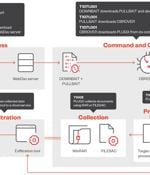Security News

Bank customers in the Central Asia region have been targeted by a new strain of Android malware codenamed Ajina.Banker since at least November 2024 with the goal of harvesting financial...

Nearly 1.3 million Android-based TV boxes running outdated versions of the operating system and belonging to users spanning 197 countries have been infected by a new malware dubbed Vo1d (aka...

Iraqi government networks have emerged as the target of an "elaborate" cyber attack campaign orchestrated by an Iran state-sponsored threat actor called OilRig. The attacks singled out Iraqi...

Cybersecurity researchers have uncovered a new set of malicious Python packages that target software developers under the guise of coding assessments. "The new samples were tracked to GitHub...

The NoName ransomware gang has been trying to build a reputation for more than three years targeting small and medium-sized businesses worldwide with its encryptors and may now be working as a...

The threat actor tracked as Mustang Panda has refined its malware arsenal to include new tools in order to facilitate data exfiltration and the deployment of next-stage payloads, according to new...

New attacks attributed to China-based cyber espionage group Mustang Panda show that the threat actor switched to new strategies and malware called FDMTP and PTSOCKET to download payloads and steal...

Android device users in South Korea have emerged as a target of a new mobile malware campaign that delivers a new type of threat dubbed SpyAgent. The malware "targets mnemonic keys by scanning for...

Threat actors affiliated with North Korea have been observed leveraging LinkedIn as a way to target developers as part of a fake job recruiting operation. These attacks employ coding tests as a...

A new Android malware named SpyAgent uses optical character recognition (OCR) technology to steal cryptocurrency wallet recovery phrases from screenshots stored on the mobile device. [...]